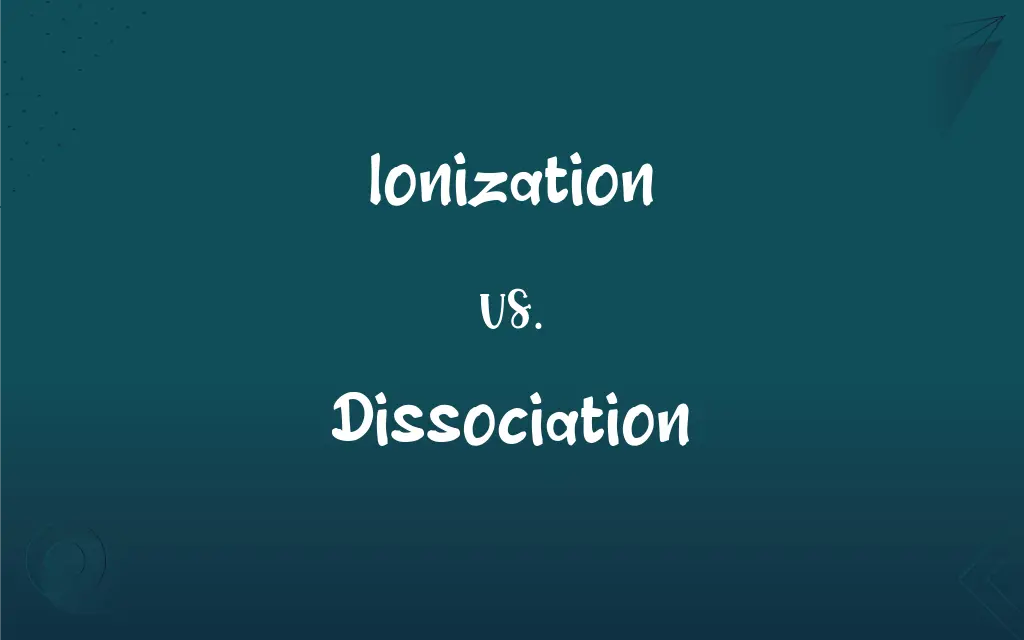Ionization vs. Dissociation: What's the Difference?
Edited by Janet White || By Harlon Moss || Updated on October 20, 2023
Ionization involves the gain or loss of electrons from atoms or molecules, forming ions; dissociation involves the breaking apart of molecules into simpler molecules, atoms, or ions.

Key Differences
Ionization and dissociation are both important processes in the realm of chemistry, but they serve different purposes and have distinct meanings. Ionization refers to the process wherein an atom or molecule either gains or loses electrons, thus becoming positively or negatively charged. On the other hand, dissociation pertains to the splitting or breaking apart of a molecule into its simpler constituents, which can be ions, atoms, or smaller molecules.
In ionization, the resulting species is termed an ion, which can either be a cation (positively charged) or an anion (negatively charged). This process is highly significant in various applications, including the functioning of electronic devices and the conduction of electricity in solutions. Dissociation, conversely, plays a pivotal role in many chemical reactions, especially in the context of acids and bases breaking apart in aqueous solutions.
Both ionization and dissociation are often observed when substances dissolve in water. For instance, when table salt (sodium chloride) dissolves, it undergoes dissociation into its respective ions: sodium and chloride. In contrast, when hydrogen atoms lose electrons, they undergo ionization, leading to the formation of hydrogen ions.
Furthermore, the energy required for ionization and dissociation can vary. Ionization energy is the energy required to remove an electron from an atom or molecule. Dissociation energy, on the other hand, refers to the energy needed to break a particular bond in a molecule. Both processes, ionization and dissociation, are crucial for understanding the behavior of matter at a molecular level.
In summary, while both ionization and dissociation relate to the changes in atoms and molecules, ionization specifically deals with electron transitions, resulting in ions, whereas dissociation focuses on the breaking apart of molecules into simpler entities.
ADVERTISEMENT
Comparison Chart
Definition
Process of gaining or losing electrons.
Process of breaking molecules into simpler units.
Result
Produces ions.
Produces ions, atoms, or smaller molecules.
Energy Term
Ionization Energy.
Dissociation Energy.
Example
Hydrogen atom losing an electron.
Sodium chloride breaking into sodium and chloride ions.
Context of Occurrence
In electronic devices, conductance of electricity.
In chemical reactions, especially acids/bases in aqueous solutions.
ADVERTISEMENT
Ionization and Dissociation Definitions
Ionization
Ionization involves the removal or addition of electrons.
When sodium atom undergoes ionization, it loses an electron to form Na+.
Dissociation
Dissociation can occur in various states of matter.
The dissociation of gases upon heating leads to simpler molecules.
Ionization
Ionization results in a charge on atoms or molecules.
High ionization energies indicate a reluctance to form ions.
Dissociation
Dissociation involves the separation of molecules into constituent parts.
The dissociation of water produces H+ and OH- ions.
Ionization
Ionization can be caused by heat, radiation, or chemical reactions.
Ionization due to radiation exposure can damage living cells.
Dissociation
Dissociation often occurs in chemical reactions.
In a reaction, the dissociation of a reactant can lead to multiple products.
Ionization
Ionization refers to the process of creating ions.
The ionization of hydrogen atoms produces H+ ions.
Dissociation
Dissociation can result in the formation of ions or neutral particles.
The dissociation of acetic acid in water produces acetate ions and hydrogen ions.
Ionization
Ionization energy is the energy required to ionize an atom or molecule.
Helium has a higher ionization energy than hydrogen.
Dissociation
Dissociation is fundamental in acid-base chemistry.
The strength of an acid is often determined by its dissociation in water.
Ionization
The formation of or separation into ions by heat, electrical discharge, radiation, or chemical reaction.
Dissociation
The act of dissociating or the condition of having been dissociated.
FAQs
What results from the ionization of an atom?
The result is an ion, either positively (cation) or negatively (anion) charged.
Is ionization energy a measure of how easily an atom ionizes?
Yes, higher ionization energy means the atom is less likely to ionize.
What is ionization in simple terms?
Ionization is the process where atoms or molecules gain or lose electrons, forming ions.
How does ionization affect atomic size?
When atoms lose electrons (ionize), they typically become smaller; when they gain electrons, they become larger.
What happens during the dissociation of a compound?
The compound breaks down into its constituent ions, atoms, or simpler molecules.
Does dissociation always result in ions?
No, dissociation can produce ions, atoms, or smaller molecules.
Can dissociation occur in solids?
Yes, though it's most commonly discussed in the context of solutions.
How does ionization relate to conductivity in solutions?
Ionized substances produce charged ions that can conduct electricity in solutions.
Is ionization a physical or chemical change?
Ionization is a chemical change as it alters the composition of the atom or molecule.
How is ionization used in mass spectrometry?
Ionization helps convert neutral atoms or molecules into ions, which are then detected and analyzed.
Are all chemical reactions involving water examples of dissociation?
No, but many involve the dissociation of solutes in water.
Does dissociation always require energy?
Most dissociation processes require energy, but some can be spontaneous.
What's the relationship between ionization and pH?
Ionization of certain substances, like acids, affects the concentration of H+ ions, thus influencing pH.
Is the dissociation of strong acids complete in water?
Yes, strong acids like hydrochloric acid dissociate completely, producing a large concentration of ions.
How does dissociation differ from ionization?
Dissociation involves breaking molecules into simpler units, while ionization involves gaining or losing electrons.
What factors influence the degree of dissociation?
Factors include temperature, concentration, and the nature of the molecule.
Can ionization occur in gases?
Yes, ionization can occur in gases, especially under high temperatures or radiation.
Can dissociation and ionization occur simultaneously?
Yes, for instance, when certain acids dissociate in water, they also ionize.
What's a common example of dissociation in daily life?
The dissociation of table salt in water, forming sodium and chloride ions.
Why is ionization important in electronic devices?
Ionization allows for the movement of charged particles, facilitating electricity conduction.
About Author
Written by
Harlon MossHarlon is a seasoned quality moderator and accomplished content writer for Difference Wiki. An alumnus of the prestigious University of California, he earned his degree in Computer Science. Leveraging his academic background, Harlon brings a meticulous and informed perspective to his work, ensuring content accuracy and excellence.
Edited by
Janet WhiteJanet White has been an esteemed writer and blogger for Difference Wiki. Holding a Master's degree in Science and Medical Journalism from the prestigious Boston University, she has consistently demonstrated her expertise and passion for her field. When she's not immersed in her work, Janet relishes her time exercising, delving into a good book, and cherishing moments with friends and family.































































